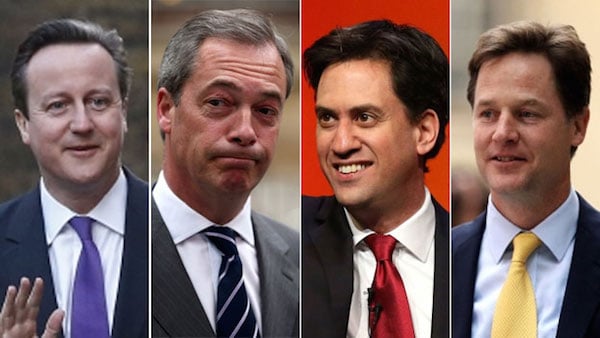Art World
As the UK Gets Ready for General Election, What’s in It for the Art Industry?
Will the new election put an end to funding cuts in the arts?

Photo via: Super Onm
Will the new election put an end to funding cuts in the arts?

Lorena Muñoz-Alonso

The citizens of the UK are counting the hours until their next General Election on May 7, and the participating parties launched their manifestos last week in a final effort to convince the undecided. But what’s at stake for the workers of the creative industries in particular?
Their 2010 manifestos generally forecast a five-year period of austerity, slashed budgets, and funding cuts for the arts (see Funding Cuts Will Decimate Staff at British Museums Expert Says, British Museums Warned About Selling Off Works and Staffing Crisis at London’s National Gallery).
In 2015, the new manifestos—even if stated in rather vague terms—evidence a greater concern with the arts and education, and the positive impact that a strong cultural landscape could have on the national economy.
The Arts Council, England’s most important public funding body for the arts, has thankfully boiled down the brand new manifestos and released a summary of the proposals of each of the parties to help shed some light on what’s really behind the political speak.
The ruling Conservative Party has vowed to keep access to major museums and galleries free of charge, and to deliver free Wi-Fi and support for e-books in libraries. It has also promised to maintain tax reliefs for the creative industries (which include films, theater, video games, animation, and orchestras).
Further plans in the Conservative manifesto include supporting a new theater and India Gallery in Manchester, a Great Exhibition in the North, and a new concert hall in London.
What Would a Labour Government Mean for the Arts?
Art is a key concern for Ed Miliband, the candidate from the Labour Party, who, in a speech given last February, vowed to move art “to the heart” of a Labour government.
Their manifesto places great emphasis on universal access to creative education in schools and after-school clubs. This angle would also affect art institutions that receive taxpayers’ money, as they would need to commit to fostering education programs aimed at young people.
A Miliband-led government would create a Prime Minister’s committee on the Arts, Culture and Creative Industries. The manifesto also states that they would “work with public bodies to rebalance arts funding across the country,” as well as “increase the number of apprenticeships in the creative industries.”
UKIP Makes Clear Statement against “Multiculturalism” in the UK
The Liberal Democrats “understand that arts, creative industries and culture are crucial to Britain’s success and essential for personal fulfillment and quality of life.”
Their program doesn’t go into excessive detail, but they state they would keep free admission to museums and galleries, while giving them greater autonomy. They would also endeavor to keep the BBC independent and Channel 4 in public ownership.
The controversial, anti-immigration party UKIP tackles cultural issues through two main areas. Under the heading of British Culture they state: “We reject multiculturalism, the doctrine whereby different ethnic and religious groups are encouraged to maintain all aspects of their cultures, instead of integrating into our majority culture […]. We believe multiculturalism has led to an alarming fragmentation of British society.”
In the fields of Heritage and Tourism, their proposals include the abolition of the current Department for Culture, Media and Sport, spreading its tasks instead to other departments. They would also establish a Minister for Heritage and Tourism, and support local arts projects in seaside towns.
The Green Party Proposes Higher Budget for the Arts
Meanwhile, the Green Party proposes to reduce VAT to a 5 percent for live performances (the standard VAT rate is 20 percent). They would also give local authorities powers to support live performances in the arts with local funding.
The Greens are actually the only party to include a specific spending commitment on the arts, with a total of £500 million a year (the current budget for arts funding is £451 million, according to the BBC).